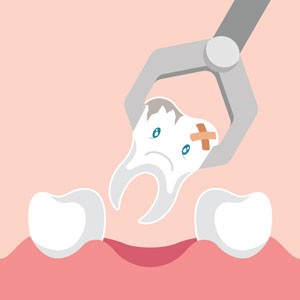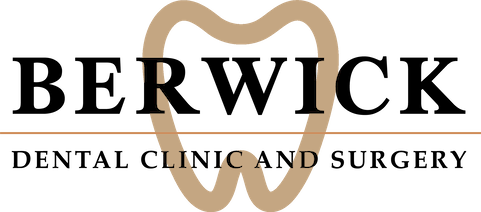Tooth Extractions at Berwick Dental Clinic & Surgery
We believe in taking all possible measures to save your natural teeth. There are certain cases, however, in which the most appropriate solution is to have your tooth extracted. The team at Berwick Dental Clinic & Surgery is well-versed in providing comfortable extractions so that you won’t have to feel concerned about discomfort during the procedure.
Why Get an Extraction?

What to Expect
What is Tooth Extraction?
Tooth extraction, a common dental procedure performed at Berwick Dental Clinic, involves the careful removal of a tooth from its socket within the jawbone. This procedure is typically a last resort when other dental treatments cannot restore the health and functionality of the tooth. There are several reasons why a tooth extraction may be necessary:
Severe Tooth Decay:
When this progresses to the point where a filling, crown, or other restorative procedures can’t salvage the tooth, an extraction becomes necessary. This helps to prevent the spread of infection and alleviates pain.
Impacted Wisdom Teeth:
Wisdom teeth, also known as third molars, often lack the space to grow properly. When they become impacted, or trapped in your jawbone or gums, they can cause pain, infection, and even affect the alignment of other teeth. In such cases, extraction helps protect overall oral health.
Orthodontic Treatment:
For those getting braces or other orthodontic treatments, extractions may be needed to create room for the movement of teeth. This is particularly true in cases of severe overcrowding, where the size of the jaw isn’t sufficient to accommodate all teeth. It’s important to note that tooth extraction is always performed under local or general anaesthesia, ensuring the comfort of the patient throughout the process. After the procedure, our team provides detailed aftercare instructions to promote healing and prevent complications.
How Does Tooth Extraction Work?
The process of tooth extraction at Berwick Dental Clinic is a meticulous procedure performed by our skilled dentists or oral surgeons, ensuring patient comfort and optimal results. Here’s a breakdown of what you can expect:
Initial Examination:
Our team will first conduct a thorough examination to ascertain if tooth extraction is indeed the best solution for your dental issue. This involves assessing your oral health, the condition of the tooth in question, and discussing your medical history.
Explanation of Procedure:
We believe in keeping our patients informed. Once the decision for extraction is made, we’ll walk you through the entire process, ensuring you understand what will happen during the procedure.
Application of Anaesthesia:
Patient comfort is paramount to us. Before we start the extraction, a local anaesthetic is applied to numb the area, ensuring you won’t feel any pain during the procedure.
Extraction Process:
The tooth is then carefully loosened using a dental instrument called an elevator. When it’s sufficiently loose, it’s gently removed with forceps. If necessary, stitches may be applied to aid your healing process.
Post-Procedure Instructions:
After the extraction, we provide detailed instructions for home care to ensure a smooth recovery.
Tooth Replacement Options: If you wish, we can also discuss solutions for replacing the extracted tooth, such as a dental implant. We’re more than happy to guide you through the available options to restore your smile.
By following this detailed process, we aim to make tooth extraction in Berwick as comfortable and stress-free as possible.
How Long Does It Take to Recover from a Tooth Extraction?
The recovery timeline after a tooth extraction at our Berwick clinic can vary based on the individual and the complexity of the extraction. Generally, you can expect to return to routine activities within 48 to 72 hours following the procedure. The initial healing of the gum tissue typically takes about one to two weeks, during which time the empty tooth socket will have mostly healed, bleeding should no longer be present, and swelling should be minimal.
However, complete healing of the jawbone can take several weeks to months. After a week to ten days, granulation tissue forms, providing protection for the extraction site until bone can form there. While the soft tissue will usually fully heal in about three to four weeks, it can take a few months to fully heal from a tooth extraction, especially if the extraction was surgical (involving a tooth that is still within the gums).
How Painful is a Tooth Extraction?
While you may feel some discomfort during and after a tooth extraction, it shouldn’t be painful due to the use of anaesthesia. You can expect:
- Mild discomfort once the anaesthesia wears off.
- Pain manageable by over-the-counter or prescribed painkillers.
How Long Does the Pain Last After Tooth Extraction?
After a tooth extraction procedure at Berwick Dental Clinic, patients can expect to experience some degree of discomfort. This is a normal part of the healing process. The intensity of the pain often peaks within the first 24 hours post-extraction, but typically starts to subside after two to three days.
However, it’s essential to note that each person’s healing process is unique and some may continue to experience intermittent discomfort up to a week after the procedure. This lingering discomfort can usually be managed with over-the-counter pain relievers or those prescribed by your dentist.
If pain persists beyond a week, or suddenly worsens, it could indicate a complication such as dry socket or infection, and it’s recommended to contact your dentist immediately. Remember, proper aftercare can significantly reduce pain and speed up recovery time after a tooth extraction.
What Are the Risks of Tooth Extraction?
While tooth extraction is generally safe, it carries some potential risks:
- Dry socket, a painful condition that can occur if the blood clot that aids in healing is lost too soon.
- Infection, although rare, can occur, especially if the extraction site is not properly cared for.
- Damage to surrounding teeth, especially if the tooth being removed is impacted or firmly anchored.
What to Expect When Getting Teeth Removed?
When getting a tooth removed, you can expect the following steps:
- A consultation where your dentist will explain the procedure and answer any questions.
- An x-ray of the affected area to help plan the extraction.
- Discussion about anaesthesia options and which one would be best for you.
- Post-extraction, you’ll receive instructions regarding diet, cleaning, and medication to ensure a smooth recovery.
How Much Does It Cost to Get a Tooth Pulled?
The cost of a tooth extraction in Berwick can vary based on the complexity of the procedure. However, Berwick Dental Clinic offers several ways to make the cost more manageable:
Flexible Payment Plans:
Options like Afterpay, Openpay, ZIP, and HUMM allow you to spread out the cost of your treatment.
In-House Direct Debit:
For orthodontic treatments, we offer an in-house direct debit payment method.
Superannuation Release:
You may be eligible to access your superannuation to cover the costs of necessary dental procedures.
Remember, we’re a part of the HCF preferred providers and the SMILE fee group, and we also accept CDBS, making it even easier to manage your dental health costs.

